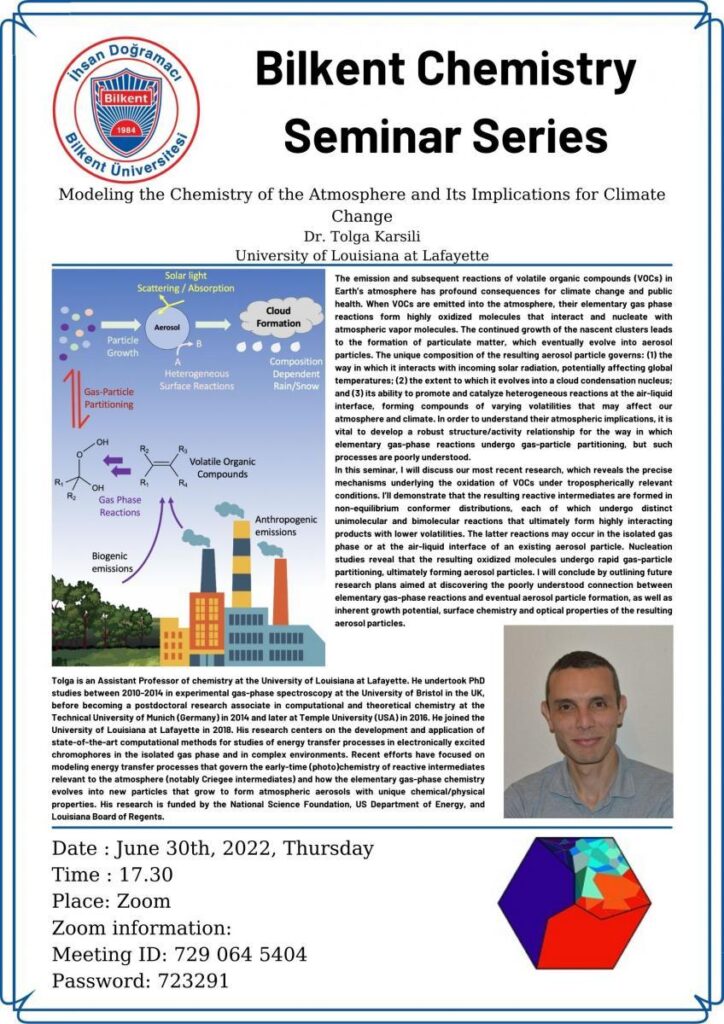Spring ’22 Department Seminars with Dr. Tolga Karsili
Title: Modeling the Chemistry of the Atmosphere and Its Implications for Climate Change
Speaker: Dr. Tolga Karsili
Department of Chemistry, University of Louisiana at Lafayette,
Lafayette, Louisiana, United States
Date: June 30th, 2022, Thursday
Time: 12:30
Place: Zoom

Abstract:
The emission and subsequent reactions of volatile organic compounds (VOCs) in Earth’s atmosphere has profound consequences for climate change and public health. When VOCs are emitted into the atmosphere, their elementary gas phase reactions form highly oxidized molecules that interact and nucleate with atmospheric vapor molecules. The continued growth of the nascent clusters leads to the formation of particulate matter, which eventually evolve into aerosol particles. The unique composition of the resulting aerosol particle governs: (1) the way in which it interacts with incoming solar radiation, potentially affecting global temperatures: (2) the extent to which it evolves into a cloud condensation nucleus; and (3) its ability to promote and catalyze heterogeneous reactions at the air-liquid interface, forming compounds of varying volatilities that may affect our atmosphere and climate. In order to understand their atmospheric implications, it is vital to develop a robust structure/activity relationship for the way in which elementary gas-phase reactions undergo gas-particle partitioning, but such processes are poorly understood.
In this seminar, I will discuss our most recent research, which reveals the precise mechanisms underlying the oxidiation of VOCs under tropospherically relevant conditions. I’ll demonstrate that the resulting reactive intermediates are formed in non-equilibrium conformer distributions, each of which undergo distinct unimolecular and bimolecular reactions that ultimately form highly interacting products with lower volatilities. The latter reactions may occur in the isolated gas phase or at the air-liquid interface of an existing aerosol particle. Nucleation studies reveal that the resulting oxidized molecules undergo rapid gas-particle partitioning, ultimately forming aerosol particles. I will conclude by outlining future research plans aimed at discovering the poorly understood connection between elementary gas-phase reactions and eventual aerosol particle formation, as well as inherent growth potential, surface chemistry and optical properties of the resulting aerosol particles.
Short Biography of the Speaker:
Tolga is an Assistant Professor of chemistry at the University of Louisiana at Lafayette. He undertook PhD studies between 2010-2014 in experimental gas-phase spectroscopy at the University of Bristol in the UK, before becoming a postdoctoral research associate in computational and theoretical chemistry at the Technical University of Munich (Germany) in 2014 and later at Temple University (USA) in 2016. He joined the University of Louisiana at Lafayette in 2018. His research centers on the development and application of state-of-the-art computational methods for studies of energy transfer processes in electronically excited chromophores in the isolated gas phase and in complex environments. Recent efforts have focused on modeling energy transfer processes that govern the early-time (photo)chemistry of reactive intermediates relevant to the atmosphere (notably Criegee intermediates) and how the elementary gas-phase chemistry evolves into new particles that grow to form atmospheric aerosols with unique chemical/physical properties. His research is funded by the National Science Foundation, US Department of Energy, and Louisiana Board of Regents.